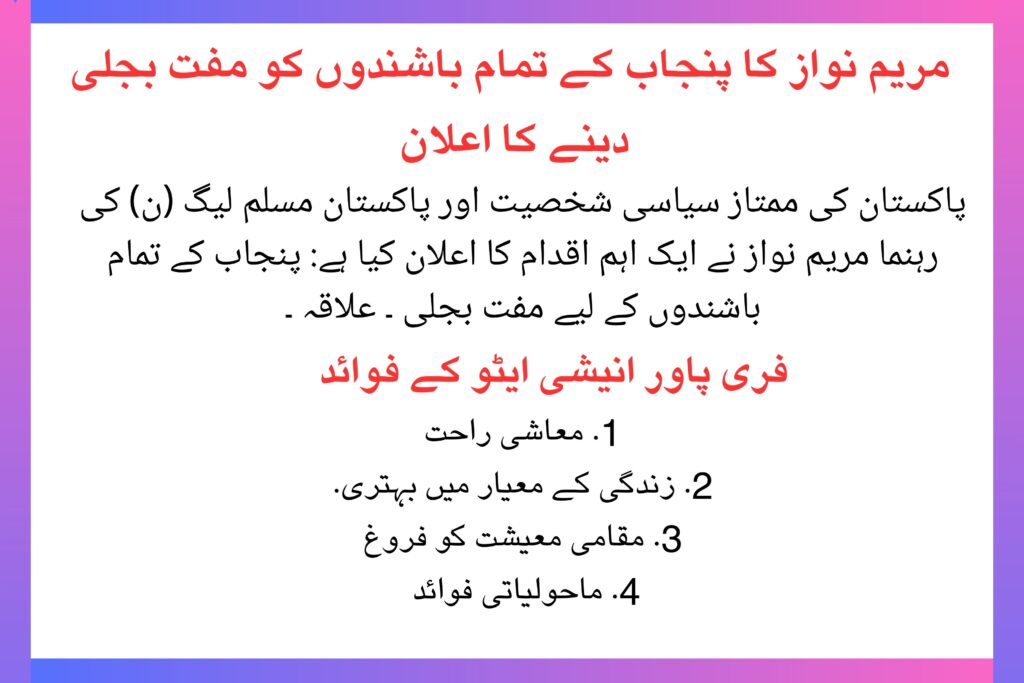Contents
Punjab Residents Free Electricity 2024
Introduction
Maryam Nawaz, a prominent political figure in Pakistan and a leader of the Pakistan Muslim League-Nawaz (PML-N), has announced a groundbreaking initiative: free electricity for all residents of Punjab. This move aims to ease the financial burden on the people of Punjab, ensuring that every household has access to free power. Let’s delve into the details of this initiative, its implications, and its potential impact on the region.

Who is Maryam Nawaz?
Maryam Nawaz is the daughter of former Prime Minister Nawaz Sharif and has become a significant political leader in Pakistan. Known for her active role in the PML-N, she has been vocal about various social and economic issues facing the country. Her recent announcement of providing free electricity to Punjab’s residents underscores her commitment to improving the people’s living standards.
The Free Power Initiative
The free power initiative is a bold step taken by Maryam Nawaz to provide relief to the people of Punjab. Here are the key aspects of the initiative:
Universal Access to Electricity
Under this initiative, every household in Punjab will receive free electricity. This move aims to ensure that no family has to worry about paying electricity bills, thereby reducing the financial strain on the people.
Funding the Initiative
The initiative will be funded through a combination of government subsidies, reallocating budgetary resources, and seeking international aid. The government plans to cut down on unnecessary expenditures and divert those funds toward providing free electricity.
Implementation Plan
The implementation of this initiative will be carried out in phases. Initially, the focus will be on providing free electricity to low-income households, followed by a gradual extension to cover all residents of Punjab. The government will collaborate with electricity distribution companies to ensure a smooth and efficient rollout.
Benefits of the Free Power Initiative
The free power initiative is expected to bring several benefits to the residents of Punjab:
Economic Relief
One of the primary benefits of this initiative is the economic relief it will provide to households. With no electricity bills to worry about, families can save a significant portion of their income, which can be used for other essential needs like education, healthcare, and food.
Improved Quality of Life
Access to free electricity will lead to an improved quality of life. Households will have uninterrupted access to power, enabling them to use electrical appliances, study, and work from home without any hindrance. This will also reduce the stress associated with power outages and high electricity bills.
Boost to Local Economy
The free power initiative is expected to stimulate the local economy. With more disposable income, people will likely spend more on goods and services, boosting local businesses and creating job opportunities. Additionally, industries and businesses will benefit from reduced operational costs, leading to increased productivity and growth.
Environmental Benefits
The initiative also has environmental benefits. By promoting the use of electricity, the government aims to reduce the reliance on non-renewable energy sources like gas and coal. This shift towards cleaner energy sources will help in reducing carbon emissions and combating climate change.
Challenges and Criticisms
While the free power initiative is a commendable step, it is not without its challenges and criticisms:
Financial Sustainability
One of the major concerns is the financial sustainability of the initiative. Providing free electricity to millions of residents requires substantial funding, and there are concerns about the long-term feasibility of this initiative. Critics argue that the government needs a robust plan to ensure that the initiative can be sustained without putting undue strain on the country’s finances.
Infrastructure Challenges
Implementing this initiative also poses significant infrastructure challenges. Ensuring that every household has access to electricity requires substantial upgrades to the existing power distribution network. The government will need to invest in modernizing the infrastructure to prevent power outages and ensure a reliable supply of electricity.
Political Opposition
The initiative has faced criticism from political opponents who argue that it is a populist move aimed at gaining political mileage. They contend that the initiative may not be as effective as promised and could lead to further economic challenges for the country.
Addressing the Challenges
To address these challenges, the government needs to take several steps:
Transparent Funding Mechanism
The government should establish a transparent funding mechanism to ensure that the initiative is financially sustainable. This could involve reallocating funds from less critical projects, seeking international aid, and encouraging private-sector investment in the energy sector.
Infrastructure Development
Investing in infrastructure development is crucial for the success of the initiative. The government should prioritize upgrading the power distribution network and ensuring that it can handle the increased demand for electricity. This will require collaboration with energy experts and stakeholders to develop a comprehensive infrastructure plan.
Political Consensus
Building political consensus is essential for the success of the initiative. The government should engage with opposition parties, stakeholders, and the public to address their concerns and ensure broad-based support for the initiative. This will help in creating a united front and ensuring the smooth implementation of the initiative.
Conclusion
Maryam Nawaz’s announcement of free electricity for all residents of Punjab is a bold and ambitious step aimed at providing economic relief and improving the quality of life for the people. While the initiative faces several challenges, with careful planning, transparent funding, and robust infrastructure development, it has the potential to bring significant benefits to the region. The success of this initiative could serve as a model for other regions and countries looking to provide similar economic relief to their citizens.


